WMG News
Flagship Coventry transport project takes a major step forward to net zero
- Real-world urban highway demo site of innovative rail track system for Coventry Very Light Rail (CVLR) unveiled on University of Warwick campus
- Testing facility will allow simulation of various scenarios, enabling active engagement with key stakeholders including utility companies and city transport planners
- WMG and Ingerop engineers have capitalised on advanced material and manufacturing processes developed over recent years
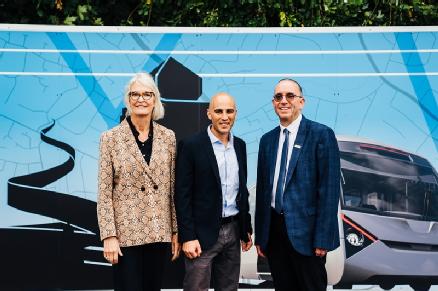 The Coventry Very Light Rail Project (CVLR) has taken a major step forward, as Coventry City CouncilLink opens in a new window and WMG, at the University of Warwick, launch a real-world demo site for its light rail track system.
The Coventry Very Light Rail Project (CVLR) has taken a major step forward, as Coventry City CouncilLink opens in a new window and WMG, at the University of Warwick, launch a real-world demo site for its light rail track system.
The site, based at WMG, University of Warwick, gives stakeholders a snapshot of what’s to come in Coventry, when the first phase of the city route commences.
Using advanced material and manufacturing processes, researchers and engineers at WMG have worked alongside track-design experts at IngeropLink opens in a new window to create, design and build the demo site including the unique track system, which is not only more affordable to install but also enables rapid installation - minimising disruption to local properties and businesses.
The track form, designed to sit within the top 30cm of existing highway surfaces, is easy to install and can be removed rapidly; significantly reducing clashes with utilities and potentially saving millions of pounds otherwise spent on excavation and moving gas, electrical and telecommunication systems when installing more traditional track forms. With installation costed at approximately £10m per km, the track is significantly cheaper compared to current tram tracks which can cost upwards of £25m per km, and significantly more in city centre locations.
The new track has been developed in parallel to a zero-emission, battery-powered lightweight shuttle vehicle created in partnership with TDi. The vision of Coventry Very Light Rail is that as technology matures it will become autonomous and work similarly to the London Underground system, where service is frequent and passengers can hop on and off.
The vehicle itself is lightweight, and there will be no overhead power supply along the route, significantly reducing infrastructure costs, complexity and visual impact on the city-scape.
Councillor Jim O’Boyle, Cabinet Member for Jobs, Regeneration and Climate Change, said: “This new track test site is a key part of our work to demonstrate the viability of the breakthrough technology in this track. In a world first, we’re aiming to keep pipes and cables in the ground, lowering installation costs and making Coventry Very Light Rail possible in our city and across the country.
“Coventry Very Light Rail will form the backbone of our future transport network, but we’re investing in many projects to make our city’s transport cleaner, greener and more convenient for residents. Coventry Very Light Rail will fit seamlessly with our plans to be the UK's first all-electric bus city and our plans to continue to provide more on-street electric charge points than anywhere outside London.”
Following installation at the University of Warwick, Coventry City Council will install test track at its Whitley Depot waste facility to test it with heavy goods vehicles, and also at the Very Light Rail National Innovation Centre (VLRNIC) in Dudley, where vehicle testing is currently taking place. The installation will form part of the facility’s 15m radius loop, built to test the CVLR prototype vehicle’s cornering system and will enable full system integration testing to be undertaken.
Dr Christopher Micallef, Principal Engineer at WMG, University of Warwick comments: “The University of Warwick urban track demonstration site provides an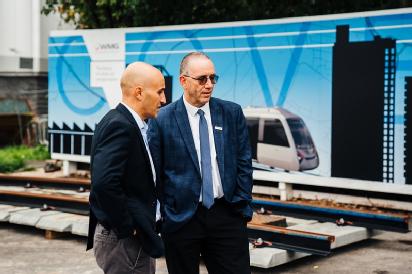 ideal scenario to prove-out the installation methods of the novel track system. The site will enable various competing sub-systems such as the encapsulation and pavement systems to be trialled to further explore the advantages and challenges.
ideal scenario to prove-out the installation methods of the novel track system. The site will enable various competing sub-systems such as the encapsulation and pavement systems to be trialled to further explore the advantages and challenges.
“The site includes features such as water drainage gullies, buried utilities and a sewage access chamber to ensure that solutions to these real-world complexities can be explored. After the first phase, which is all about the track installation process, the site will be further utilised to allow various scenarios to be simulated and enable active engagement with key stakeholders such as utility companies, materials and subsystems supply chain and city transport planners. Eventually it could provide a facility to train the next generation of track installation teams.”
Andy Street, Mayor of the West Midlands, said: “This very light rail project is a fantastic demonstration of collaboration across our region – whether it’s the development at Dudley, this new test track at Warwick University or soon enough the first route in Coventry city centre.
“The West Midlands Combined Authority is investing £71.5m into very light rail. Designing and building a light rail service rapidly and at a fraction of the cost of regular Metro lines has the potential to transform our public transport network. It is also a great example of cutting edge innovation that can help us to meet our #WM2041 net zero commitment and tackle the climate emergency. Our region is ideally placed to become the home of the green industrial revolution.”
Coventry Very Light rail is being led by Coventry City Council and has received funding from the West Midlands Combined Authority, the Coventry and Warwickshire Local Enterprise Partnership and Coventry City Council.
-ENDS-
Sustainable aviation collaboration wins best UK industry-academia partnership for 2022
- University of Birmingham and Rolls-Royce win Bhattacharyya Award 2022 for their work on Advanced Metallic Alloys
- Award-winning partnership recognised for advancing sustainable aviation for the future
The Royal Academy of Engineering and WMG, at the University of Warwick, have announced the University of Birmingham’s partnership with Rolls-Royce on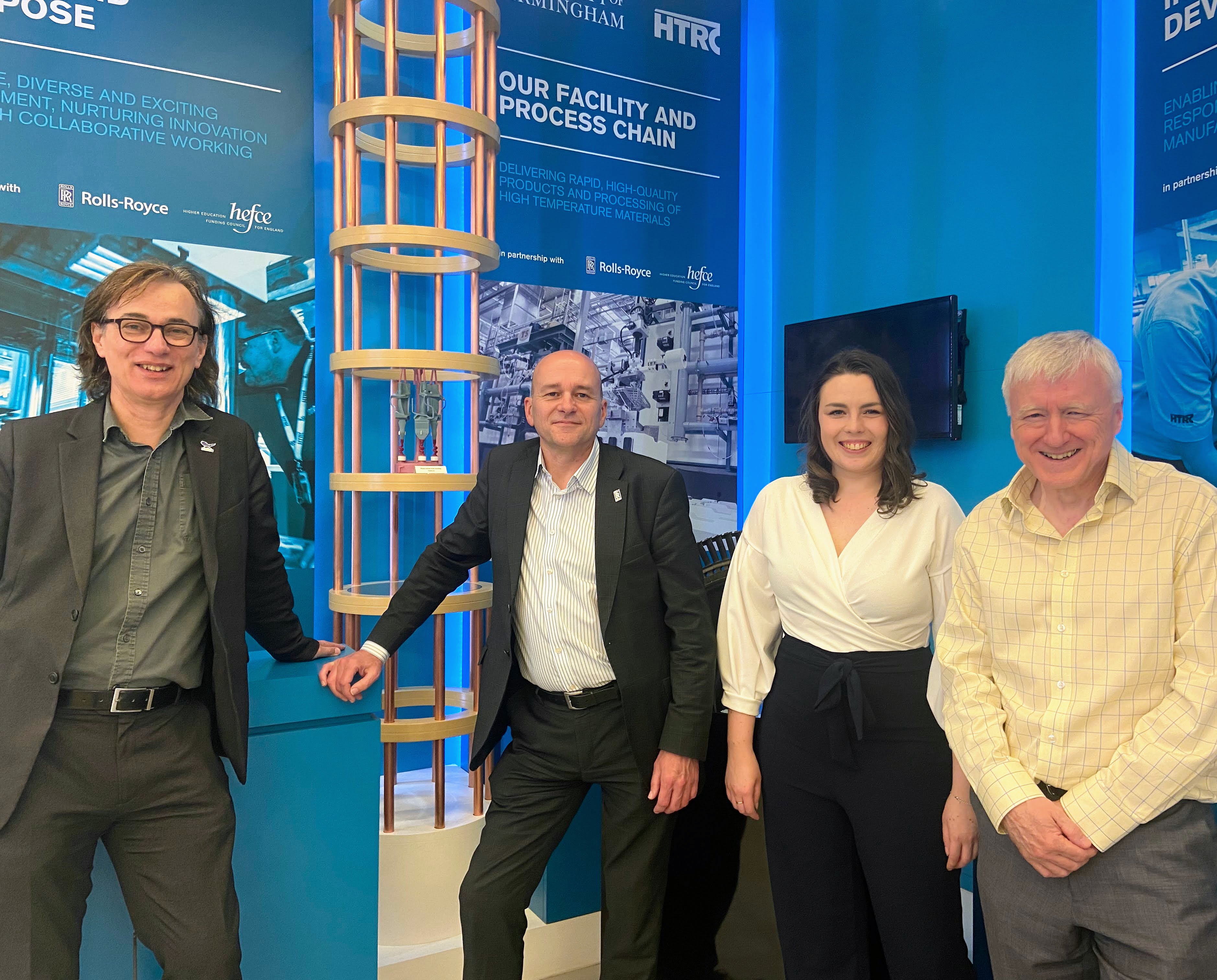 Advanced Metallic Alloys as the winner of the Bhattacharyya Award for 2022. The Award, which carries a £25,000 prize, has been presented in recognition of an exemplary academia-industry partnership that has helped to lead the UK’s work on creating safe, efficient, and sustainable aeroengines for the future.
Advanced Metallic Alloys as the winner of the Bhattacharyya Award for 2022. The Award, which carries a £25,000 prize, has been presented in recognition of an exemplary academia-industry partnership that has helped to lead the UK’s work on creating safe, efficient, and sustainable aeroengines for the future.
The Bhattacharyya Award is funded by the Department for Business, Energy and Industrial Strategy and was created to encourage more private and academic entities to collaborate, as a tribute to the late Professor Lord Kumar Bhattacharyya KT CBE FREng FRS, Regius Professor of Manufacturing at the University of Warwick and founder of WMG.
Dating back to 1989, the University of Birmingham-Rolls-Royce collaboration has enabled transformative advances in engine efficiencies - directly addressing environmental concerns, while also saving billions of pounds over 30 years of large fleet activity. Their partnership is at the heart of activities to develop and deliver the new engine technologies required to achieve or improve upon the ACARE Flightpath 2050 targets of 75% reduction in CO2 emissions and 90% reduction in NOx.
This industry-academia collaboration has seen extensive, continuous research into processes that are critical for maintaining a competitive and safe aerospace industry and cementing the UK as a leader in aeroengine architectures. These processes have included the enhancement of titanium and nickel disc alloys, development of new titanium aluminide alloys and single crystal turbine blade alloys for jet engines – all using advanced process and materials modelling.
Additionally, the partnership’s established High Temperature Research Centre is ideally placed for developing future aerospace technologies, including solutions for electrification of flight, hydrogen-powered aeroengines and use of alternative, sustainable aviation fuel.
Together, the University of Birmingham and Rolls-Royce partnership has significantly advanced metallurgy in the UK, built new infrastructure and promoted relationships between UK universities for over three decades. The partnership has also focused on developing future talent, having trained over 100 doctoral students in Birmingham who have joined Rolls-Royce as materials and manufacturing specialists.
Paul Bowen FREng, Feeney Professor of Metallurgy/Deputy-Pro-Vice-Chancellor (Industrial Partners) and Rolls-Royce University Technology Centre Director at the University of Birmingham, said: “Our team is immensely proud to win this award on behalf of two generations of researchers in our partnership. They have produced safe, efficient aero-engines and have delivered new technologies, new buildings and developed careers. Winning this award is a testimony to the unrivalled support that Rolls-Royce have provided to universities in support of the metallurgical base of the UK.”
Professor Dame Ann Dowling OM DBE FREng FRS, past-President of the Royal Academy of Engineering, and chair of the judging panel for the Bhattacharyya Award, said: “The University of Birmingham and Rolls-Royce’s partnership has contributed immensely to the UK’s aerospace industry. Together, they’ve embodied the spirit of the Bhattacharyya Award by promoting wider collaboration between industry and universities, and in developing the UK’s future talent.”
Margot James, Executive Chair at WMG, University of Warwick, said: “This partnership is a well-deserving winner and demonstrates the power of industry-academia collaboration to address a challenge as timely and as globally significant as sustainable aviation. We hope that this award celebrating Lord Bhattacharyya’s legacy continues to inspire future academics and industry partners to drive further co-operation, creativity, and innovation in the UK.
WMG welcomes representatives from the Malaysia-UK Higher Education Collaboration Enrichment Programme
It was an honour to welcome guests from the Malaysia-UK Higher Education Collaboration Enrichment Programme (MY-UK HECEP), a flagship programme organised by the Malaysian Government, to WMG at the University of Warwick on Friday (23 September).
MY-UK HECEP started in 2018 with the aim of strengthening partnerships between universities in Malaysia and UK. The Programme brings together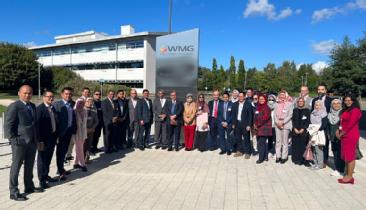 policymakers, academics, researchers, and university management to exchange best practice in the internationalisation of higher education.
policymakers, academics, researchers, and university management to exchange best practice in the internationalisation of higher education.
The universities in the programme work together on student and staff mobility, shared research, innovative curriculum development and digitalisation, doctoral training, transnational education (including Master's and PhD programmes), building industry relationships, and improving graduate employability.
The guests were met by Dr Kogi Balakrishnan, WMG’s Director of Client and Business Development (East Asia); before being introduced to Dr Ben Silverstone who explained more about WMG’s research capabilities and education programmes including the WMG Skills Centre.
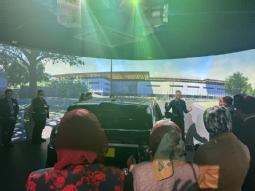 They were then shown the 3xD Simulator, the world's first immersive, simulated environment for smart and connected vehicles, before enjoying a guided tour of both the WMG Degree Apprenticeship Centre and the Energy Innovation Centre - where they heard more about WMG’s world leading battery research.
They were then shown the 3xD Simulator, the world's first immersive, simulated environment for smart and connected vehicles, before enjoying a guided tour of both the WMG Degree Apprenticeship Centre and the Energy Innovation Centre - where they heard more about WMG’s world leading battery research.
Alia Alias, Education Attache, High Commission of Malaysia, London said: “It was indeed an insightful tour and active engagement we had during the visit. The Ministry of Higher Education Malaysia is looking forward to strengthening the bridge between academics and industry with the model that WMG has established. The Malaysian university representatives have briefly discussed future collaboration, especially on research collaboration and staff attachment to integrate possible collaboration improvements that lead to innovation. Many thanks to WMG for hosting us and Dr Kogi for coordinating this fantastic visit and partnership.”
Dr Kogi Balakrishnan said: “High level strategic visits between academics, policy makers and technocrats focussed on exchange of innovative ideas and best practises between the UK and Malaysian institutions is an embodiment of the close bilateral educational and research ties between both our countries.”
World’s largest scenario database for Automated Vehicles is now open to public - Safety PoolTM Scenario Database
- Safety Pool™, led by WMG at the University of Warwick and Deepen AI, launches public access to the over 250,000 scenarios via a credit system
- Organisations can now earn credits for their scenario contributions to the database
- Credits can be used to access the entire set of scenarios in the database
- UK’s Vehicle Certification Agency is evaluating the use of Safety PoolTM as part of future type approvals of Automated Vehicles
Leading experts at WMG at the University of Warwick and Deepen AI, have launched credit-based access to the largest public store of scenarios for testing automated vehicles. The Safety Pool™ Scenario Database, features over 250,000 different scenarios. WMG and Deepen AI are also working with regulators internationally to help evaluate the safety of Automated Vehicles using the Safety PoolTM Scenario Database.
Safety remains one of the biggest challenges around self-driving vehicles. Driven by Safety PoolTM ’s vision of safety of self-driving vehicles being pre-competitive, the Safety PoolTM Scenario Database has created an ecosystem to enable sharing of test scenarios amongst organisations worldwide.
The database provides a large range of scenarios in different operational design domains (ODDs i.e., operating conditions) that can be leveraged by governments, industry, and academia alike to test and benchmark Automated Driving Systems (ADSs). Bolstered by scenarios generated by novel scenario generation methods: 1) knowledge-based and 2) data-based, a methodology also mentioned by the EU’s Regulatory Act on Automated Driving Systems, scenarios in Safety PoolTM are focused on uncovering failures in automated vehicles as they capture those edge-case scenarios.
Under the credit system, users are rewarded with credits for submitting scenarios to the database. Contributions are scored based on uniqueness of the scenarios and their validity, and corresponding credits are awarded to the organisation. These credits can be redeemed to gain access to more scenarios. This system encourages users to contribute to growing the database and making more scenarios available to the self-driving vehicle community.
Dr Siddartha Khastgir, Head of Verification & Validation, at WMG, University of Warwick, said: “With the public launch of the Safety Pool™ Scenario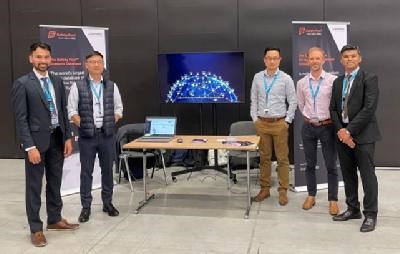 Database, we are democratizing critical data that was not easily available in the ecosystem. By aligning with international standards and working closely with regulators and developers in the UK and internationally, we are driven by the mission of making safety of automated vehicles pre-competitive.”
Database, we are democratizing critical data that was not easily available in the ecosystem. By aligning with international standards and working closely with regulators and developers in the UK and internationally, we are driven by the mission of making safety of automated vehicles pre-competitive.”
Jamie McFaden, Head of Automated Vehicle Technologies Group, Vehicle Certification Agency said: “The Vehicle Certification Agency, the UK’s Type Approval Authority, recognises the importance of ODD based testing and as a result is evaluating the use of Safety PoolTM Scenario Database as part of the Type Approval process for Automated Driving Systems.”
Coherent with our mission to align with international standards, today, each scenario has been launched in ASAM OpenScenario 1.1 and ASAM OpenDRIVE 1.6 formats. This provides further interoperability between stakeholders using ASAM OpenX standards for their simulation-based testing of automated vehicles.
The scenarios also cover a diverse set of ODD attributes and manoeuvre types such as urban environments, highways, and under varied environmental conditions where vehicles perform different manoeuvres such as cut-ins, overtaking etc. Use cases supported include Automated Lane Keeping Systems, low-speed shuttle, urban level 4, highway ADAS etc. Scenarios can also be efficiently searched using the ODD and Behaviour tags as per ASAM OpenLabel standard.
With Safety Pool™, industry, academic, industry and government experts come together to create the standards that will make the operation of automated vehicles safe everywhere. This builds an environment which enables the uptake of automated and autonomous technology in road vehicles.
Mohammad Musa, CEO, Deepen AI, said:
“By contributing and working within the Safety Pool™ framework, commercial stakeholders across AV fleet operators, OEMs, Tier 1 suppliers and all other Tier 2+ suppliers can massively accelerate verification & validation as well as share insights & edge cases that are very hard for a single stakeholder to collect by themselves.”
Eric Barbier, Head of Safety, Wayve said:
“Safety is core to the development of automated vehicles and everything we do at Wayve. As an industry, it is essential that we collaborate around a common ecosystem for safety assurance. Wayve is excited by the opportunity unlocked by the Safety Pool™ initiative and we look forward to leveraging its extensive database of curated scenarios.”
Since the launch of this pioneering project in March 2021, WMG at the University of Warwick and Deepen AI have collaborated with stakeholders around the world. To date, over 450 organisations have enrolled in the Safety PoolTM Scenario Database. The next step in WMG’s activity is working closely with regulators in the UK and internationally on enabling a safety assurance for automated vehicles through the Safety PoolTM Scenario Database.
Dr Maria J. Alonso, Lead, Automotive in the Software-Driven Era Initiative, World Economic Forum said:
“Collaboration among stakeholders is key to ensure that autonomous vehicles offer the highest possible levels of safety. The Safety PoolTM Scenario Database, with its over 250,000 scenarios and its collaborative approach, provides a platform to contribute to safer mobility on our roads.”
The development of the Safety Pool™ Scenario Database was funded by UK’s Centre for Connected & Autonomous Vehicles (CCAV), Innovate UK and Zenzic funded Midlands Future Mobility project led by WMG, University of Warwick. Furthermore, the WMG centre for High Value Manufacturing Catapult has further supported the continuous enhancements of the database with its support to the Verification & Validation team at WMG.
Notes to editors:
University of Warwick press office contact: Simmie Korotane | Media Relations | Press & Media Relations | University of Warwick | Email: Simmie.korotane@warwick.ac.uk
Useful Links:
Link to Safety PoolTM videos: https://youtu.be/edxw_VhzAYA
Link to Safety PoolTM website: https://www.safetypool.ai/
Link to Safety PoolTM Knowledge base: https://docs.safetypooldb.ai/
Global challenge-tackling partnerships between industry and universities announced as Bhattacharyya Award finalists
- Six industry-academia partnerships from across the UK shortlisted for the annual Bhattacharyya Award including solutions for tsunami resilience, sustainable aviation, industrial decarbonisation, and cybersecurity
- Winning partnership to be announced at awards ceremony on 29 September 2022
- Applications for Bhattacharyya Award 2023 open until 16 December 2022
The Royal Academy of Engineering and WMG at the University of Warwick have shortlisted six exceptional industry-academia partnerships from across the UK for the second annual Bhattacharyya Award.
The Bhattacharyya Award and a cash prize of £25,000 will be presented to the team who best demonstrate how industry and universities can work together. The winning partnership will be announced on 29 September 2022.
The Bhattacharyya Award is a tribute to Professor Lord Kumar Bhattacharyya KT CBE FREng FRS, the Regius Professor of Manufacturing at the University of Warwick and founder of WMG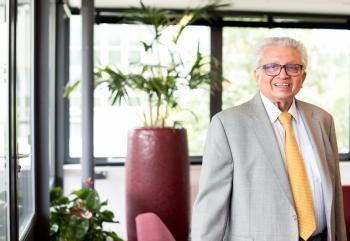 who advocated for greater collaboration between industry and universities. Funded by the Department for Business, Energy and Industrial Strategy, the annual Bhattacharyya Award is open to UK universities and colleges that have demonstrated a sustained, strategic industrial partnership that has benefitted society and is deserving of national recognition. Industry-academia partnerships from any academic discipline are eligible for the Bhattacharyya Award.
who advocated for greater collaboration between industry and universities. Funded by the Department for Business, Energy and Industrial Strategy, the annual Bhattacharyya Award is open to UK universities and colleges that have demonstrated a sustained, strategic industrial partnership that has benefitted society and is deserving of national recognition. Industry-academia partnerships from any academic discipline are eligible for the Bhattacharyya Award.
This year’s shortlist spotlights partnerships that address some of the most pressing challenges in the UK and globally, including coastal resilience against tsunamis, low carbon electricity supply, cybersecurity, sustainable aviation, and support for rail and steel industries.
The full shortlist of finalists is as follows:
· University of Birmingham and Rolls-Royce: Advanced Metallic Alloys
Dating back to 1989, this collaboration has enabled transformative advances in engine efficiencies - directly addressing environmental concerns, while also saving billions of pounds over 30 years of large fleet activity. The partnership is at the heart of activities to develop and deliver the new engine technologies required to achieve or better the ACARE Flightpath 2050 targets of 75% reduction in CO2 emissions and 90% reduction in NOx.
· University of Cambridge and ARM: Digital Security by Design
This partnership focuses on redesigning the architecture that integrates both hardware and software with technology that will fundamentally improve cyber security. This new architecture, known as CHERI (Capability Hardware Enhanced RISC Instructions), could stop around two thirds of hacks, cyber-attacks and data breaches, according to Microsoft. The partnership launched a prototype known as Morello, which has been adopted by the UK government’s Digital Security Design programme and is being rolled out to industry and academia for wide-scale testing and development.
· Imperial College London and Transport Strategy Centre: Optimising Transport Systems
The Centre’s focus on urban transport systems has become increasingly important as the world attempts to tackle the challenges of climate change and transport-related air pollution. Its work has provided over £1.5 billion worth of benefits to the rail industry over the last 15 years. The Centre’s research and collaboration has benefitted 125 major transport providers in the UK and globally – influencing funding policy, improving cost efficiency, service quality, and safety, and helping transport operators respond to Covid-19.
· University of Manchester and National Grid: Impacts to Electricity Networks
By providing low carbon electricity, this partnership has delivered significant CO2 reductions, increased productivity, stimulated large investment in new jobs and engineering activity in the UK, and supported the growth of many SMEs. Knowledge generated by the partnership has provided cost savings of approximately £11 million to the UK energy network and helped to develop many key projects - including the T-Pylon in Somerset that delivers power to six million homes.
· Swansea University and Steel Strategic Alliance: Sustainable Steelmaking
This partnership aims to help the UK to become a leader in sustainable steelmaking, with a focus on decarbonising the whole manufacturing supply chain. Some of its major projects include the creation of the Materials and Manufacturing Academy, that provides industry-led postgraduate training, the Steel and Metals Institute, providing advanced steel testing, and the SUSTAIN Future Manufacturing Research Hub, that develops carbon-neutral steel supply chains and sustainable solutions for transport, energy and buildings.
· University College London, HR Wallingford and Arup: Advanced Tsunami Engineering
This collaboration began following the 2004 Indian Ocean Tsunami, which killed more than 250,000 people and caused widespread destruction. The partnership led to the creation of a new tsunami simulator, unique worldwide for its ability to recreate realistic representations of tsunamis. The partnership’s work has improved knowledge of tsunami interaction with coastal environments, developed emergency evacuation protocols and provided tsunami assessments in the UK, including for the Wylfa Newydd nuclear plant project in North Wales, as well as internationally.
Professor Dame Ann Dowling OM DBE FREng FRS, former President of the Royal Academy of Engineering and Chair of the judging panel for the Bhattacharyya Award, said: “All six shortlisted partnerships are excellent examples of industry-academia collaboration, with timely and innovative responses to some of the most challenging issues facing society today. It is a privilege to showcase these successful collaborations and we hope that doing so fosters even greater connection between industry and academia in the UK.”
Margot James, Executive Chair of WMG, University of Warwick, said: “It’s great to see the extremely high quality of industry-academia partnerships shortlisted for the second annual Bhattacharyya Award. As a celebration of Lord Bhattacharyya’s legacy, the Award continues to highlight how building symmetry between academia and industry is so vital for meeting the needs of society, and adapting to global challenges. We look forward to seeing which collaboration is selected as the overall winner.”
The winner of the Bhattacharyya Award will be announced on Thursday 29 September 2022, at an event showcasing the shortlisted partnerships at the University of Warwick.
Those wishing to attend the Bhattacharyya Award ceremony can register via the Academy’s website.
Applications for Bhattacharyya Award 2023 are now open until 16 December 2022 and can be submitted via the Academy’s online grant system.
Notes for Editors
For media enquiries please contact: Chris Urquhart at the Royal Academy of Engineering Tel. +44 207 766 0725; email: Chris.Urquhart@raeng.org.uk
WMG launches new sustainable elastomer research facility
WMG, at the University of Warwick, has launched its new sustainable elastomer research facility based in the International Institute for Nanocomposites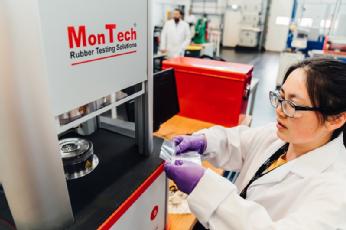 Manufacturing (IINM).
Manufacturing (IINM).
High performance elastomers are essential components in applications across a range of critical sectors, most notably for vehicle tyres, but also for footwear, soft robotics and automation.
However, the high durability of conventional rubbers also results in them being extremely difficult to recycle at the end of their service life, with many simply being incinerated and buried in landfills. The need for new and sustainable elastomer technology is becoming more urgent as society transitions towards fully electric vehicles, which are currently heavier and can cause tyre wear up to 30% faster. Tyre wear emission is accumulated as the second largest microplastics pollution globally.
The main scientific focus of the new facility is to bring together state-of-the-art research from across rubber composite processing and synthetic polymer chemistry - including manufacturing technology, multiscale characterisation, and prototype sustainable rubber products.
Capabilities within the facility include a twin-roll mill for rubber compounding; automated compression moulding and moving die rheometer (MDR); abrasion testing; and a new dynamic rubber process analyser (RPA), which enables advanced analysis of rubber networks over a temperature range of -40 °C to 232 °C, and a wide frequency range, as well as unique rheological characterisation at large amplitude oscillatory shear (LAOS).
Within the IINM there is also a wet chemistry laboratory designed for new formulation development, and rubber and nanoparticle functionalisation, as well as polymer characterisation and testing laboratories to support sustainable elastomer research and development.
Dr Chaoying Wan, Reader of Functional Polymers and Nanocomposites at WMG, University of Warwick explains: “Our new RPA has the capacity of a wider temperature range - it is the only one in the UK, and one of only a few in the world. This function is extremely useful for evaluating elastomer materials as well as for advanced scientific analysis. With support from the High Value Manufacturing Catapult, we are excited to be furthering our research towards extending the functionality of rubber materials and making the products recyclable and sustainable at end-of-life.”
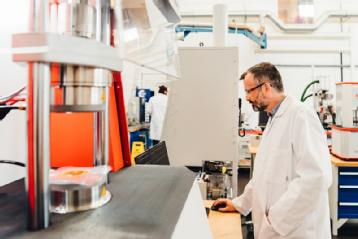 Projects currently underway in the new facility include integrating self-healing properties which result in improved safety and extended lifespan for tyres; stretchable sensors; and investigating other rubber products to enhance the durability of rubbers by the addition of nanofillers, including graphene, and recycling of rubbers for road and pavement uses.
Projects currently underway in the new facility include integrating self-healing properties which result in improved safety and extended lifespan for tyres; stretchable sensors; and investigating other rubber products to enhance the durability of rubbers by the addition of nanofillers, including graphene, and recycling of rubbers for road and pavement uses.
Find out more about WMG’s Nanocomposites research here: Nanocomposites (warwick.ac.uk)
Contacts:
Dr Chaoying Wan – Rubber Chemistry and Dielectric Elastomer Technology
Professor Tony McNally - Composites of Elastomers and Nanomaterials
WMG and Jaguar Land Rover bridge the gap between academia and industry through the appointment of new Industrial Professor
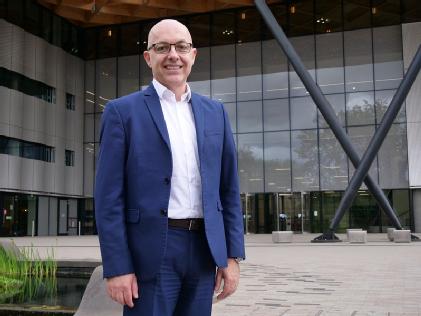 WMG at the University of Warwick has demonstrated its intentions to continue delivering industrially-informed research and education by bolstering its expertise and appointing Dr Alex Mouzakitis, Programme Director for Cyber Security at Jaguar Land Rover, as an Industrial Professor of Automotive Systems.
WMG at the University of Warwick has demonstrated its intentions to continue delivering industrially-informed research and education by bolstering its expertise and appointing Dr Alex Mouzakitis, Programme Director for Cyber Security at Jaguar Land Rover, as an Industrial Professor of Automotive Systems.
The new role has been awarded to Dr Mouzakitis in recognition of an influential 20-year career at Jaguar Land Rover, within which he has been leading collaborative multi-million-pound research and development projects and helping shape industrially relevant education across automotive machine learning, software development, architectural systems and cyber security with WMG since 2006.
The main objective of the Industrial Professorship is to bridge industry and academia, helping industrialise academic research approaches and shape education to help Jaguar Land Rover adopt the latest talent and technologies within its operations and product line.
As part of his new role, Dr Mouzakitis will be delivering lectures, defining agendas, addressing skills gaps and future needs for training, supporting bids for collaborative research projects, supervising PhD students and featuring on WMG advisory panels.
Commenting on the Industrial Professorship, Dr Mouzakitis said:
“It’s a privilege and an honour to receive the appointment. This is recognition for the work that I have done fully-hearted over the past 20 years, and this motivates me for the next 20 years. This also carries a level of responsibility to do more going forward as part of Jaguar Land Rover’s Creators’ Code to deliver modern luxury through exceptional engineering. I’ve had an active working relationship with WMG for over 16 years and look forward to continuing this relationship to help prepare for and respond to future skills needs throughout the automotive industry.
“We need to produce graduates that are better equipped to take on industrial jobs from day one, without the need to retrain. I will be addressing this and exploring what we can do to close this skills gap. If we are to retain and add to the volume and quality of manufacturing in the UK, whilst remaining competitive globally, we need skills.”
Since achieving a PhD in ‘Machine Learning and Artificial Intelligence for Autonomous Vehicles’ at the University of Wales (now known as the University of South Wales) in 2002, and later achieving an EngD (Title: Innovative Solutions for Automotive Embedded Software Development) at WMG, University of Warwick, Dr Mouzakitis has published over 135 academic papers across international journals and conferences and has also been actively contributing to the creation and delivery of MSc programme content.
Dr Mouzakitis is a Chartered Engineer and a Fellow of the IET and InstMC engineering institutions. He is a member of Industrial Advisory Panels across several international conferences, a member of the InstMC System and Control Technology Panel, the InstMC National Council and the InstMC Accreditation Panel.
Thomas Müller, Executive Director of Product Engineering at Jaguar Land Rover, commented:
“I want to say a big congratulations to Alex. Not only is it a great personal achievement, but it is also hugely significant for Jaguar Land Rover. This appointment will help us to bridge the gap between industry and academia, something that is increasingly important as we continue to Reimagine and become a proud creator of modern luxury.”
Dr Mouzakitis has affiliations and collaborative research relationships with other internationally-renowned academic institutions, including the University of Cambridge, Harvard University, University of Oxford, MIT Media Lab, University of Birmingham, University of Southampton, University College London, University of Surrey, University of Edinburgh, Heriot Watt University, Loughborough University and Cranfield University. In addition, Dr Mouzakitis has featured as an external examiner for Masters and Doctoral level awards.
Professor Paul Jennings, Pro Dean (Research) at WMG, University of Warwick, has been collaborating with Dr Mouzakitis since 2006, and also mentored the newly-appointed Industrial Professor as part of his EngD. Commenting on the appointment, Professor Jennings said:
“This Industrial Professorship is recognition of Dr Mouzakitis’ significant achievements across systems engineering within industry. The award also acknowledges impressive academic contributions as a mark of quality and rigour across research and education.
“We will now further tap into Dr Mouzakitis’ extensive knowledge, experience and insights in the industry, and work together to ensure that our research and education programmes continue to be leading edge and are tuned to the requirements of a fast-changing industry as we move to electrified, connected and automated mobility.”
Dr Mouzakitis will be delivering his inaugural lecture as Industrial Professor of Automotive Systems at WMG, University of Warwick later this year.
Find out more about Dr Mouzakitis here.
ENDS
WMG, University of Warwick
WMG is a world leading research and education group, transforming organisations and driving innovation through a unique combination of collaborative research and development, and pioneering education programmes.
As an international role model for successful partnerships between academia and the private and public sectors, WMG develops advancements nationally and globally, in applied science, technology and engineering, to deliver real impact to economic growth, society and the environment.
WMG’s education programmes focus on lifelong learning of the brightest talent, from the WMG Academies for Young Engineers, degree apprenticeships, undergraduate and postgraduate, through to professional programmes.
An academic department of the University of Warwick, and a centre for the HVM Catapult, WMG was founded by the late Professor Lord Kumar Bhattacharyya in 1980 to help reinvigorate UK manufacturing and improve competitiveness through innovation and skills development.
Young engineers hit the headlines with Design & Make triumph
Three schools from the Black Country and Warwickshire have been crowned as the main winners at one of the biggest independent manufacturing-education events in the UK.
Ernesford Grange Community Academy, Great Wyrley Academy and WMG Academy for Young Engineers Coventry beat off competition from five other rivals to take the Manufacturing,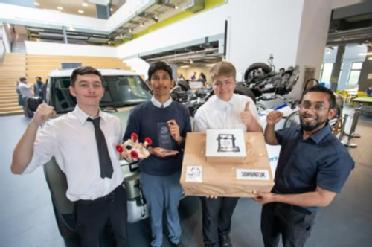 Innovation and Efficiency titles respectively at the Design & Make Challenge 2022.
Innovation and Efficiency titles respectively at the Design & Make Challenge 2022.
The trio were joined on the podium by Alcester Grammar School, who claimed the first ever ‘Communications’ prize for its use of social media in promoting the day.
Organised by the Manufacturing Assembly Network (MAN), more than 35 students swapped their daily lessons for the chance to test out their design, engineering, prototyping and communication skills at the all-day event held at WMG Academy for Young Engineers in Solihull.
Teams of four Year 11 and Year 12 pupils were set the challenge of using basic materials and tools to make a vehicle that could be propelled by a falling weight. They tested their devices, modified them and then raced them on a purpose-built 7.5m long track to see which one would complete the distance in the fastest possible time – a race that WMG Academy Coventry won in just 3.64 seconds.
“Now, more than ever, we need young people to choose engineering and manufacturing as a career and we’re not going to change perceptions by sitting on our hands, doing nothing,” explained Austin Owens, founder of Grove Design (Pembridge) Ltd and Co-Chair of the Manufacturing Assembly Network.
“This was a comeback for the Design & Make Challenge after a Covid-19 enforced break and we were delighted to see the appetite to take part was still there. I have to say the task was the hardest yet and the young people really embraced it.”
He went on to add: “The atmosphere in the room was amazing and I’m convinced we’ve seen some of the engineers of the future here, engineers that will go on and improve the way we live for the better.”
Ernesford Grange Community Academy, Great Wyrley Academy and WMG Academy Coventry all received a 3D printer for their efforts.
This latest technology was kindly donated by 3DPRINTUK, who are specialists in low volume production using state-of-the-art powder bed fusion 3D printing systems with polymer materials.
Nick Allen, Managing Director of 3DPRINTUK, commented: “We are both proud and delighted to sponsor the Design & Make Challenge 2022.
“The competition is a great fit for us. By donating 3D printers to the winners, it allows the next generation of engineers and manufacturers to learn in a hands-on way about the advantages - and disadvantages - of 3D printing for any given application. It’s something we are passionate about both now and for the future.”
Joining Alcester Grammar School, Ernesford Grange Community Academy, Great Wyrley Academy and WMG Academy Coventry at the Design & Make day were Gospel Oak School, Lawrence Sheriff School, Southam College and WMG Academy Solihull.
Peter Davies, Chief Executive of James Lister & Sons and Co-Chair of the Manufacturing Assembly Network, added his support: “The day is all about bringing sound design and engineering principles to the fore to solve a topical industrial issue, with young people encouraged to work together to develop innovative designs and then build a product they can test against their peers.
“Apprentices from MAN companies and graduates from WMG at the University of Warwick, were working with the groups and talking about their own experiences following a career in manufacturing and some of the skills they may need to realise their ambition.
“All the feedback we received was positive, which excites us about doing it again next year. We now urge other manufacturers to look at how they can play a role in helping promote our sector to young people.”
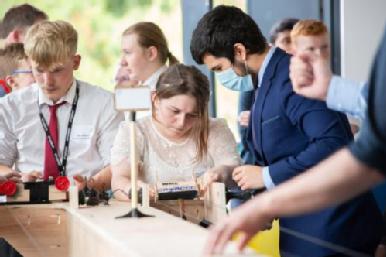 Dr Mark Swift, Head of SME Programmes at WMG at the University of Warwick, concluded: “Design & Make is a wonderful example of how to inspire future engineers - making it real and helping to bridge the skills gap, particularly in small manufacturing and engineering businesses.
Dr Mark Swift, Head of SME Programmes at WMG at the University of Warwick, concluded: “Design & Make is a wonderful example of how to inspire future engineers - making it real and helping to bridge the skills gap, particularly in small manufacturing and engineering businesses.
“SMEs are the lifeblood of manufacturing in the UK, and they offer a wonderful, rich, challenging and rewarding destination for the next generation of engineers. They get access to all parts of the business, from working with customers and suppliers to the management team and gaining experience on the shop floor – all of this will accelerate their future career.”
About the Manufacturing Assembly Network
Formed in 2006, The Manufacturing Assembly Network is made up of Alucast, Barkley Plastics, Brandauer, Grove Design, James Lister & Sons, KimberMills International, Muller Holdings, Nemco and PP Control & Automation.
The eight sub-contract manufacturers and specialist engineering design agency form a unique global collective that works together to share best practice and secure contracts for UK industry.
It is the third year that the group has held the Design & Make Challenge and earlier competitions have resulted in 352 hours of hands-on manufacturing experience for young people, seven MAN company visits completed by schools and over £25,000 of press coverage to raise the profile of the sector.
More details on MAN can be found at www.man-group.co.uk or follow MAN Group on LinkedIn.
New programme launches in Westminster which aims to put the UK at the forefront of hydrogen innovation
An initiative which is designed to support and foster the creation of a new hydrogen economy in the Midlands has been formally launched at the House of Lords, to an audience of MPs, peers, businesses, academics and senior civil servants.
‘HyDEX’ brings together the university partners in the Energy Research Accelerator (ERA), including WMG at the University of Warwick, with multinational businesses, SMEs and other partners, in order to accelerate innovation in hydrogen, build markets and the supply chain, and support the skills needed for the new hydrogen economy.
The aim of HyDEX is to address the challenge of building a thriving new business, industrial and manufacturing sector in hydrogen, where very little currently exists. The programme allows businesses to accelerate the development and viability of new hydrogen products and associated intellectual property, while supporting the transition from declining industrial sectors and enabling the training and re-skilling required.
The £4.99 million, three-year programme, funded via the RED Fund scheme and run by Research England (part of UK Research and Innovation - UKRI), will see the ERA university partners making available their £111m worth of hydrogen facilities, large scale demonstration programmes, and research capabilities to regional businesses.
HyDEX is being supported by the expertise of leading industrial partners in transport, heating and manufacturing technologies, these include Worcester-Bosch and Cadent (hydrogen boilers and gas networks); Intelligent Energy (fuel cells); Toyota (hydrogen vehicles); FAUN Zoeller (heavy vehicles); Cenex, EQUANS (Hydrogen Networks); Progressive Energy, ITM Motive (hydrogen generation and transport respectively); Siemens and ENGIE (hydrogen production and storage).
The universities involved in the programme include Keele (project lead), Aston, Birmingham, Cranfield, Loughborough, Nottingham and Warwick. Civic partners such as the Midlands Engine, LEPs, local government and local authorities, will also add their weight to support the creation of a market for low-carbon hydrogen solutions as part of the net-zero transition.
There is also an international dimension to HyDEX, which is facilitating links with growing international markets in countries such as China, Australia and South Korea, where ERA partners have strong connections, in order to build commercial opportunities that reach beyond the Midlands and the UK.
The event at the House of Lords on Wednesday 15th June included presentations from Lord Teverson, Professor Trevor McMillan, Vice-Chancellor of Keele University, Professor Martin Freer Director of the Energy Research Accelerator, and Dennis Hayter, Vice-President of Intelligent Energy.
Speaking about HyDEX, Professor Trevor McMillan, Vice-Chancellor of Keele University, which is leading the programme, said: “We are very excited to be launching the HyDEX programme and leading it from Keele University. At Keele we have been leading the way in researching the use of hydrogen in the domestic gas heating system and in smart energy systems.
“This experience and expertise, when combined with the wealth of knowledge in the ERA partnership and our collaborators will enable HyDEX to make a significant impact on the use of hydrogen in the future.”
Professor Martin Freer, Director of the Energy Research Accelerator, added: “The ERA universities have invested significantly in hydrogen infrastructure, creating an array of great facilities and demonstration projects. The HyDEX programme will see experts from our universities, working with Midlands’ businesses to use these facilities to develop new, innovative products.”
Dr Sharon George of Keele University, Principal Investigator for HyDEX, commented: “I am looking forward to leading the HyDEX programme. It will be a great challenge - we are seeking to support the building of a hydrogen economy where one currently doesn’t exist. I am confident that with our academic, industrial and public sector partners, we will be able to demonstrate the commercial potential of hydrogen technologies, support businesses to create products, and build the skills base needed to support the transition to hydrogen.
 Alok Choudhary, Professor of Supply Chain Management and Head of Supply Chain Research Group, at WMG, University of Warwick said, “We are thrilled to be working with the HyDEX group of Midlands universities, businesses, and international partners. At WMG, our work stream will focus on establishing and strengthening the supply chain of hydrogen production, developing business models, and ensuring its sustainability for transitioning to the hydrogen economy in specific sectors. The UK government's Hydrogen Strategy is a significant step in the low carbon hydrogen development and is central to the UK's net zero strategy."
Alok Choudhary, Professor of Supply Chain Management and Head of Supply Chain Research Group, at WMG, University of Warwick said, “We are thrilled to be working with the HyDEX group of Midlands universities, businesses, and international partners. At WMG, our work stream will focus on establishing and strengthening the supply chain of hydrogen production, developing business models, and ensuring its sustainability for transitioning to the hydrogen economy in specific sectors. The UK government's Hydrogen Strategy is a significant step in the low carbon hydrogen development and is central to the UK's net zero strategy."
Dennis Hayter, Vice President of Intelligent Energy, said: “For Intelligent Energy and the other business partners involved in the programme, HyDEX provides a unique opportunity for us to develop and test our technologies and prove the worth of hydrogen as a crucial green energy source for the UK and world, as we transition to a net-zero society.”
More details about HyDEX can be found at: http://www.hydex.ac.uk/
ENDS
For more information about this press release, please contact Nick King, Marketing and Communications Manager for the Energy Research Accelerator on 07974 690632 or email mailto:nick.king@era.ac.uk
About the Energy Research Accelerator (ERA)
ERA consists of the partner universities of Midlands Innovation (Aston, Birmingham, Cranfield, Keele, Leicester, Loughborough, Nottingham and Warwick), and also the British Geological Survey (BGS). ERA aims to harness the Midlands’ combined research excellence and industry expertise to play a critical role in tackling some of the biggest challenges facing the UK. Via Innovate UK, the government committed an initial capital investment of £60m, and ERA has secured additional co-investment of £120m. This has been invested in 23 state of the art facilities which are being used by university and industrial researchers to develop new energy innovations.
Specialist electric motorcycle project hailed a great success
 Today (Tuesday 12th July 2022), marks the official completion of the Triumph TE-1 electric development project, a unique four-way partnership between WMG at the University of Warwick, Triumph Motorcycles, Williams Advanced Engineering and Integral Powertrain Ltd e-Drive Division.
Today (Tuesday 12th July 2022), marks the official completion of the Triumph TE-1 electric development project, a unique four-way partnership between WMG at the University of Warwick, Triumph Motorcycles, Williams Advanced Engineering and Integral Powertrain Ltd e-Drive Division.
The TE-1 project was funded by the Office for Zero Emission Vehicles through Innovate UK, and was set up to create ground-breaking developments in specialist electric motorcycle engineering and innovative integrated technology design. The project provides an input into Triumph’s future electric motorcycle offering, driving innovation, new standards, capability, and new intellectual property, whilst enhancing the credibility and profile of British industry and design.
Driving lower environmental impact transportation, and delivering against the UK’s focus on reducing emissions, the project also aimed to develop strong, commercially viable and sustainable partnerships with UK industry manufacturers and supply chains, whilst building expertise and capability within the UK workforce.
Nick Bloor, CEO, Triumph Motorcycles, said: “We are incredibly proud to be able to share such positive outcomes from the completion of Project Triumph TE‑1, where the prototype demonstrator has exceeded many of our initial targets and expectations. Everyone on the team is thrilled with the results we have achieved with our partners, and how the outcomes of the project will feed into the electric future to come from Triumph.”
Released today, the final testing results show how the TE-1 prototype has delivered on all targets and objectives following an extensive live testing programme which involved numerous assessments of the bike’s performance on a rolling road as well as on track.
WMG’s role in the project was to provide electrification expertise, and the critical vision to drive innovation from R&D to commercial impact, through modelling and simulation based on future market needs.
Highlights from the testing results include a standing start acceleration of 0-60mph in 3.6 seconds, peak power of 130kW (177PS / 175bhp) as well as peak torque of 109Nm (80 lb-ft), a 20-minute charge time (0-80%) and a 161km / 100-mile range based on official testing and projections. At 220kg (485 lb), the TE-1 prototype is also lighter than the equivalent electric bikes available currently by up to 25%.
20-minute charge time (0-80%) and a 161km / 100-mile range based on official testing and projections. At 220kg (485 lb), the TE-1 prototype is also lighter than the equivalent electric bikes available currently by up to 25%.
Professor David Greenwood, CEO of the High Value Manufacturing Catapult at WMG, University of Warwick, explained: “To meet our ambitious emission reduction targets in the UK we will have to rethink the way we travel, not only transitioning from ICE to electric propulsion vehicles, but also encouraging a modal shift away from private cars. Electric two wheelers have a pivotal role to play in the transport revolution as a zero-tailpipe emission option.
“In our partnership with Triumph, WMG used our research experience in electrification to demonstrate manufacturers can deliver products with a lower emission burden as well as outstanding performance-offering customers an EV that is great fun to ride.”
Read more about WMG’s Transport Electrification research here: Energy (warwick.ac.uk)
